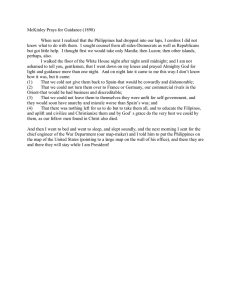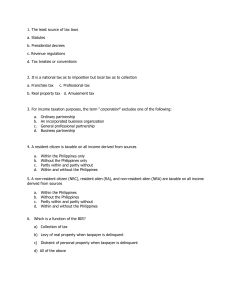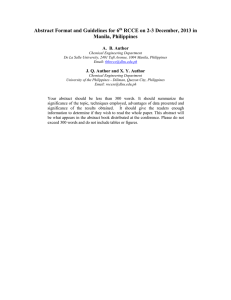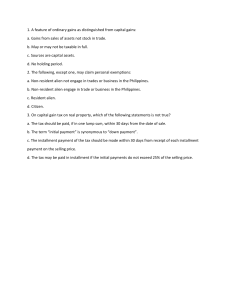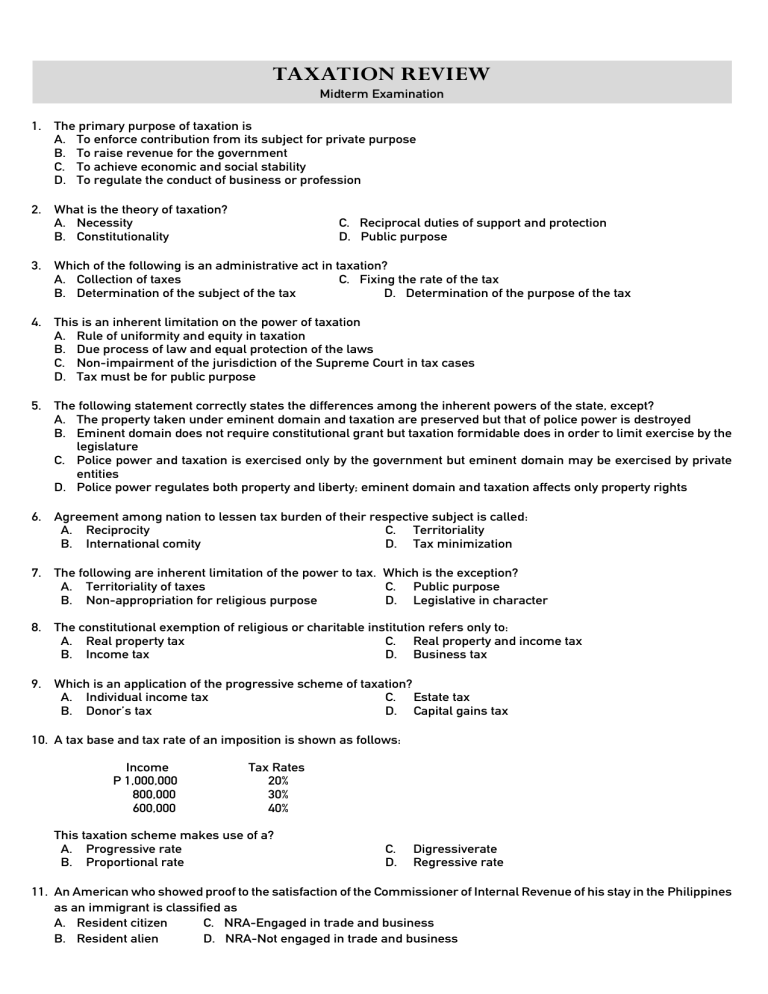
TAXATION REVIEW Midterm Examination 1. The primary purpose of taxation is A. To enforce contribution from its subject for private purpose B. To raise revenue for the government C. To achieve economic and social stability D. To regulate the conduct of business or profession 2. What is the theory of taxation? A. Necessity B. Constitutionality C. Reciprocal duties of support and protection D. Public purpose 3. Which of the following is an administrative act in taxation? A. Collection of taxes C. Fixing the rate of the tax B. Determination of the subject of the tax D. Determination of the purpose of the tax 4. This is an inherent limitation on the power of taxation A. Rule of uniformity and equity in taxation B. Due process of law and equal protection of the laws C. Non-impairment of the jurisdiction of the Supreme Court in tax cases D. Tax must be for public purpose 5. The following statement correctly states the differences among the inherent powers of the state, except? A. The property taken under eminent domain and taxation are preserved but that of police power is destroyed B. Eminent domain does not require constitutional grant but taxation formidable does in order to limit exercise by the legislature C. Police power and taxation is exercised only by the government but eminent domain may be exercised by private entities D. Police power regulates both property and liberty; eminent domain and taxation affects only property rights 6. Agreement among nation to lessen tax burden of their respective subject is called: A. Reciprocity C. Territoriality B. International comity D. Tax minimization 7. The following are inherent limitation of the power to tax. Which is the exception? A. Territoriality of taxes C. Public purpose B. Non-appropriation for religious purpose D. Legislative in character 8. The constitutional exemption of religious or charitable institution refers only to: A. Real property tax C. Real property and income tax B. Income tax D. Business tax 9. Which is an application of the progressive scheme of taxation? A. Individual income tax C. Estate tax B. Donor’s tax D. Capital gains tax 10. A tax base and tax rate of an imposition is shown as follows: Income P 1,000,000 800,000 600,000 Tax Rates 20% 30% 40% This taxation scheme makes use of a? A. Progressive rate B. Proportional rate C. D. Digressiverate Regressive rate 11. An American who showed proof to the satisfaction of the Commissioner of Internal Revenue of his stay in the Philippines as an immigrant is classified as A. Resident citizen C. NRA-Engaged in trade and business B. Resident alien D. NRA-Not engaged in trade and business 12. A Japanese who is staying in the Philippines for 183 days is a A. Resident alien B. Nonresident alien C. Nonresident alien engaged in trade or business D. Nonresident alien not engaged in trade or business 13. A Canadian who is staying in the Philippines for more than one year is a A. Resident alien B. Nonresident alien C. Nonresident alien engaged in trade or business D. Nonresident alien not engaged in trade or business 14. Nozomi made the following computations of her annual financial savings from employment, her sole source of income: Salaries, net of P59,000 withholding tax and P12,000 mandatory payroll deductions Expenses: Load expense Medical expenses Transportation expense Food, rent and utilities Bank loan repayment Miscellaneous expense Net pay P 321,000 P 10,000 8,000 25,000 100,000 20,000 15,000 ( 159,400) P 143,000 What is Nozomi’s taxable compensation income in 2021? A. 280,000 C. 380,000 B. 321,000 D. 392,000 15. Statement 1: Non-resident alien not engage in trade and business are also subject to regular income tax. Statement 2: For all taxable, taxable income means the pertinent items of gross income not subject to capital gains tax and final tax less allowable deductions. A. True, False B. False, False C. False, True D. True, True 16. The interest income from long-term peso deposits made with foreign banks is A. Subject to 20% final tax C. Subject to regular tax B. Exempt from any tax D. Subject to 15% final tax 17. The interest income from long-term peso deposits made with local banks is A. Subject to 20% final tax C. Subject to regular tax B. Exempt from any tax D. Subject to 15% final tax 18. Which is not subject to 20% final tax? A. Interest income from trust funds B. P11,000 worth of prizes C. Royalties from musical composition D. Winnings 19. Jonny, a resident citizen, deposited P2,000,000 in the 1-year time deposit of Banco de Oro. The deposit pays 8% interest. Compute the final tax on maturity. A. 32,000 C. 16,000 B. 24,000 D. 0 20. Hatty received P42,000 net of final tax from short-term deposits. Compute the final tax withheld on the interest. A. 10,500 C. 5,000 B. 9,000 D. 4,500 21. Sally, a resident citizen, deposited P5,000,000 in a non-resident foreign depository bank which pays 12% annual interest. How much final tax shall be withheld in the first year? A. 0 C. 120,000 B. 45,000 D. 150,000 22. Statement 1: The sale of foreign stocks directly to a buyer is subject to capital gains tax. Statement 2: The gain on sale of domestic stocks directly to a buyer is presumed. A. True, true B. True, false C. False, false D. False, true 23. Statement 1: The sale of exchange must result to an actual gain before the 15% capital gains tax is imposed. Statement 2: The sale or exchange must result to an actual gain before the 6% capital gains tax is imposed. A. Both statements are true B. Both statements are false C. Only statement 1 is true D. Only statement 2 is true 24. Which statement is generally true? Statement 1: A purely employed taxpayer does not have ordinary assets Statement 2: A self-employed taxpayer does not have capital asset A. Statement 1 B. Statement 2 C. Both statement 1 and 2 D. Neither statement 1 nor 2 25. Abby, a non-resident alien disposed his stock investments in a domestic corporation to Jayree, a non-resident citizen, at a gain of P300,000. Which statement is correct? A. The sale is not subject to capital gains tax since the property involved is a personal property is deemed located abroad. B. The sale is not subject to capital gains tax as Jayree, the buyer, is a non-resident individual. C. The sale is subject to capital gains tax even if the sale occurred outside the Philippines. D. None of these. 26. Daina is a security dealer. She had 10,000 ordinary stock of San Miguel Corporation, a domestic corporation, which she acquired at P100 per share. Diana sold her stock investment to Jade on April 30, 2021 at P115 per share. How much is the capital gains tax payable on the transaction? A. 5,000 C. 5,750 B. 10,000 D. 0 27. As a rule, fringe benefit furnished or granted in cash or in kind by an employer to an individual employee maybe subject to the fringe benefit tax, if given to I. Rank and file employees II. Managerial employees III. Those holding supervisory positions A. Only I and II B. Only I and III C. Only II and III D. I, II and III 28. Flames Company made the following payments in the 3rd quarter of 2021: To the supermarket in payment of groceries for the company’s manager and family To a university in payment of the tuition fee of the manager Salary of the manager, net of P50,000 withholding tax Determine the fringe benefit tax due A. 19,412 C. 22,212 B. 20,308 D. 184,118 P 16,500 24,750 350,000 29. Which of the following is subject to fringe benefit tax A. Fringe benefit of the rank and file employees B. Fringe benefit of the managerial employees C. Compensation income of the rank and file employees D. Compensation income of the managerial employees 30. A citizen of the Philippines who works and derives income from abroad is a resident citizen if he stayed outside the Philippines A. For less than 180 days C. For 183 days or more B. For more than 180 days D. For less than 183 days 31. A citizen of a foreign country is considered a non resident alien engaged in business in the Philippines if he stayed inside the Philippines A. For 183 days or more C. For more than 180 days B. For less than 183 days D. For less than 180 days 32. A resident citizen is taxable on all income derived from sources A. Within the Philippines only C. Partly within and partly without B. Without the Philippines only D. Within and without the Philippines 33. Charlotte is a minimum wage earner working in Quezon City. As such, her employer did not withhold any tax from her compensation. In addition to her statutory minimum wage, she also earned a one-time commission from her employer in September of taxable year 2018. In what months of the taxable year shall her employer withhold income tax from her statutory minimum wage? A. When she received the commission in September, she ceased to be a MWE. Her employer shall withhold income taxes from her compensation (which includes the SMW) received in the months of September thru December 2018. B. None. Her employer may not withhold income taxes from the SMW she received in all the 12 months of 2018. Her employer shall withhold CWT only from the commission she received in September 2018. C. In all the months of 2018. D. None of the above. 34. Mario is a minimum wage earner employed in a fast food restaurant in Metro Manila. Aside from this, he also earns income from the operation of a small “barbeque stand” in front of his house. What should be included in his taxable income for the year? A. His taxable income shall include his entire salary earned form the fast food restaurant, and the income from his barbeque stand. B. His taxable income shall include only his income from the barbeque stand. As far as his minimum wage is concerned, Mario is still an MWE who is entitled to exemption as such. C. Both his minimum wages and his income from his business shall be exempt from tax. D. None of the above. 35. Teri Yaki Corporation., a Japanese Corporation having no business in the Philippines is engaged in ship building. It leases some of its newly constructed ships (vessels) to Super Fairy Inc., a Philippine Carrier. What is the tax rate will apply to the rental payments to the lessor? A. 30% basic income tax C. 7.5% final tax B. 25% final tax D. 4.5% final tax 36. Rentals, charters and other fees derived by a non-resident lessor of aircraft, machineries and other equipment in the Philippines shall be subject to a tax of: A. 25% C. 4.5% B. 7.5% D. 2.5% 37. A cinematographic film owner, lessor or distributor shall pay a tax, based on its gross income from all sources within the Philippines, of: A. 25% C. 4.5% B. 7.5% D. 2.5% 38. In 2021, the taxpayer received the following prizes and winnings: Passive income Prizes Winnings Philippines P 10,000 400,000 Abroad P 400,000 100,000 What is the reportable item of gross income if the taxpayer is respectively is a resident citizen and a non-resident citizen? RC NRC A. 500,000 0 B. 510,000 10,000 C. 0 500,000 D. 910,000 410,000 39. What is the reportable item of gross income if the taxpayer is a domestic corporation and a resident foreign corporation, respectively? DC RFC A. 500,000 0 B. 510,000 10,000 C. 910,000 410,000 D. 500,000 10,000 40. Mr. Asuncion received the following royalties from the following sources: Mining claims A novel on seduction and love Basic accounting textbook Music album P 150,000 250,000 80,000 40,000 What is the total amount to be reported in gross income? A. 0 C. 400,000 B. 150,000 D. 520,000 41. Ms. Allyza is employed in JBC Corporation. She has the following for the current year: Statutory minimum wage Overtime pay Night-shift differential Commission from the same employer Total P 175,000 40,000 25,000 20,000 P 160,000 How much is the exempt amount? A. 260,000 C. 20,000 B. 240,000 D. None of the choices 42. XYZ Corporation is a foreign corporation engaged in business in the Philippines. During the year 2021, its income and expenses are shown below: Gross income, Philippines Business expenses, Philippines Gross income, South Korea Business expenses, South Korea Interest income on dollar deposit PNB-Manila Yield on money market placement in South Korea How much is the Philippine income tax due and payable? A. 4,500,000 C. 3,000,000 B. 3,750,000 D. 4,000,000 P 20,000,000 5,000,000 70,000,000 3,000,000 500,000 1,000,000 43. Assuming the corporation is not engaged in business in the Philippines, how much is the final withholding tax in the Philippines? A. 6,000,000 D. 3,750,000 B. 5,000,000 D. 4,000,000 44. It is important to know the source of income for the tax purposes (i.e., from within and without the Philippines) because: A. Some individuals and corporate taxpayers are taxed on their worldwide income while others are taxable only upon income from sources within the Philippines. B. The Philippine imposes income tax only on income from sources within C. Some individual taxpayers are citizens while others are aliens D. Export sales are not subject to income tax 45. Which of the following shall be treated as derived entirely from sources without the Philippines? A. Gains, profits and income derived from the purchase of personal property within and its sale without the Philippines. B. Gains, profits and income derived from the purchase of personal property without and its sale within the Philippines C. Gain from the sale of shares of stock in a domestic corporation regardless of where the said shares are sold D. All of the choices Use the following information for the next THREE 3 questions: A domestic corporation provided the following data for 2018: Gross profit from sales Business expenses Dividend from domestic corporation Dividend income from a resident corporation Dividend income from a non-resident corporation Capital gain on sale of land in the Philippines Selling price – P2,000,000 Fair value – P1,800,000 Cost – P1,500,000 Capital gain on sale of land in China Selling price – P1,500,000 Fair value – P1,800,000 Cost – P1,300,000 Capital gain on shares of domestic corporation Interest income from: Notes receivable Bank deposits 46. What is the income tax payable for the year? A. 366,000 B. 423,000 C. 426,000 D. 453,000 47. What is the total capital gains tax? A. 121,750 B. 37,000 C. 127,000 D. 138,000 48. What is the final tax on certain passive income? A. 13,000 B. 17,000 C. 11,750 D. 9,875 P 3,000,000 1,800,000 100,000 50,000 40,000 500,000 200,000 120,000 20,000 65,000 49. What is the applicable tax type and tax rate if a resident citizen earned royalties from franchise exercised in the Philippines? A. 20% final tax B. 10% final tax C. 8% final tax D. Regular tax (graduated tax table) 50. What is the applicable tax type and tax rate if a resident citizen earned prize amounting to P30,000 in the Philippines? A. 20% final tax B. 10% final tax C. Exempted from taxation D. Regular tax (graduated tax table) 51. What is the applicable tax type and tax rate if a resident citizen earned prize amounting to P9,800 in the Philippines? A. 20% final tax B. 10% final tax C. Exempted from taxation D. Regular tax (graduated tax table) 52. What is the applicable tax type and tax rate if a resident citizen earned winnings amounting to P30,000 in the Philippines? A. 20% final tax B. 10% final tax C. Exempted from taxation D. Regular tax (graduated tax table) 53. What is the applicable tax type and tax rate if a resident citizen earned winnings amounting to P9,800 in the Philippines? A. 20% final tax B. 10% final tax C. Exempted from taxation D. Regular tax (graduated tax table) 54. What is the applicable tax type and tax rate if a resident citizen earned winnings from PCSO Lotto amounting to P30,000 in the Philippines? A. 20% final tax B. 10% final tax C. Exempted from taxation D. Regular tax (graduated tax table) 55. What is the applicable tax type and tax rate if a resident citizen earned prize amounting to P9,800 in the Philippines? A. 20% final tax B. 10% final tax C. Exempted from taxation D. Regular tax (graduated tax table) 56. What is the applicable tax type and tax rate if a resident citizen earned USA sweepstakes winnings amounting to P30,000 in the Philippines? A. 20% final tax B. 10% final tax C. Exempted from taxation D. Regular tax (graduated tax table) 57. What is the applicable tax type and tax rate if a resident citizen received dividend from a domestic corporation? A. 20% final tax B. 10% final tax C. Exempted from taxation D. Regular tax (graduated tax table) 58. What is the applicable tax type and tax rate if a resident citizen earned royalties from books published in the Africa? A. 20% final tax B. 10% final tax C. 8% final tax D. Regular tax (graduated tax table) 59. What is the applicable tax type and tax rate if a resident citizen earned royalties from musical composition in the Philippines? A. 20% final tax B. 10% final tax C. 8% final tax D. Regular tax (graduated tax table) 60. What is the applicable tax type and tax rate if a resident citizen earned royalties from patent used in the Philippines? A. 20% final tax B. 10% final tax C. 8% final tax D. Regular tax (graduated tax table)

